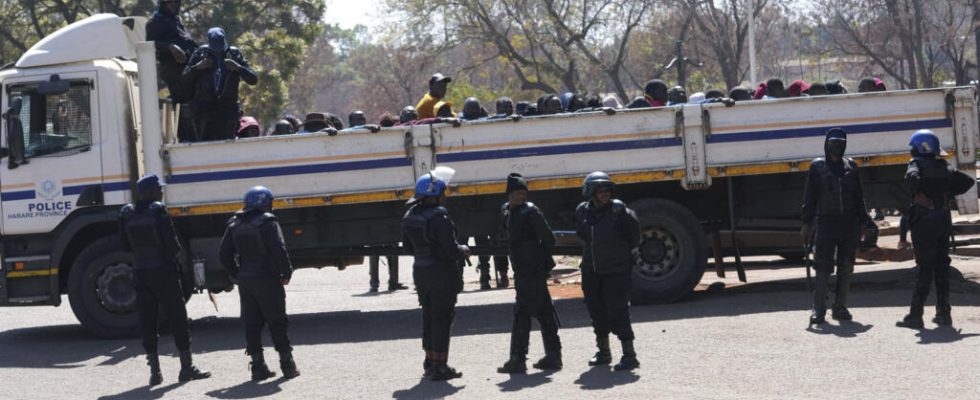Some six million voters are called to the polls on Wednesday August 23 for presidential, legislative and local elections, with two names that stand out among the 11 candidates for the presidency: Emmerson Mnangagwa, candidate for his own succession, and the leader of the opposition Nelson Chamisa, young lawyer and pastor. This in a tense climate: the opposition denounced a growing repression in the country which faces poverty and galloping inflation.
4 mins
The presidential election is akin to a return match between the two main candidates: they had already opposed each other in 2018, during the first elections without Robert Mugabe, who ruled the country with an iron fist for 30 years.
The incumbent, Emmerson Mnangagwa, of the ruling Zanu-PF party, did not propose an electoral program. He says his party’s track record is good enough. This is focused on infrastructure such as the construction of schools, highways and bridges, which are all proof that the president is keeping his promises, believe his supporters.
But suspicions of corruption have tarnished the image of these national projects, also prompting the United States to hit Zimbabwe with sanctions. These are pointed out by outgoing President Emmerson Mnangagwa, nicknamed ” the crocodile to explain the origin of the country’s economic difficulties.
As for Nelson Chamisa, his rival who had already narrowly lost in 2018, he launched his program just two weeks before the elections: some criticize him for a lack of vision. His party, the Citizens’ Coalition for Change – or the Triple-C -, report bullying and the authorities banning his rallies: on August 3, a CCC activist was stoned to death by suspected Zanu-PF supporters.
Human Rights Watch has already predicted a ” seriously flawed electoral process ».
The president is elected by absolute majority. A second round is organized only if no candidate wins 50% of the votes plus one.
Read alsoZimbabwe: civil society’s concern over elections that promise to be “little credible”
Acute economic crisis with chronic hyperinflation
According to a recent poll, the economy and unemployment are the main concerns of voters. The country is facing an acute economic crisis. Among other ills, the Zimbabwean economy suffers from chronic hyperinflation. After soaring in 2020, inflation certainly slowed in July, but it still officially exceeds 100%: some economists actually estimate it to be much higher than the official figure.
But other structural problems affect the country. “ Around 90% of Zimbabweans are employed informally. And nearly 42% of the population lives in extreme poverty “, points out Prosper Chitambara, development economist in Harare.
Former breadbasket of the region, Zimbabwe saw its agricultural production fall after the land reform of the 2000s. After 2008, growth rebounded but other shocks shook the country’s economy. Prosper Chitambara cites the climate, the Covid-19 pandemic and the war in Ukraine. Furthermore, the environment is not conducive to investment: Access to credit is difficult and very expensive. The reference interest rate is 150%. »
Infrastructure projects with Chinese loans
Prosper Chitambara still welcomes some positive points for the economy: ” We have seen a number of investments in infrastructure projects, such as highways, dams and an increase in electricity production. »
Four energy projects have been undertaken with a loan from China. Indebted, Zimbabwe is not eligible for funding from international donors, such as the IMF and the World Bank, precisely because of payment arrears.
In addition to Western sanctions for suspicion of corruption, Harare is also targeted by sanctions for rights violations.
” Intimidating climate and little enthusiasm among voters
The risk of election violence is low, analysts say. These predict a low turnout after a campaign that attracted few voters.
Because according to political analyst Ringisai Chikohomero, these elections are taking place when ” there is not really any enthusiasm and it is unusual during an election period “. This is particularly due to a ” climate of intimidation » pushing ‘ Zimbabweans to censor themselves for fear of reprisals “.
These elections are taking place in a context markedly different from the previous ones in 2018: it was then the first time that Zimbabweans did not have Robert Mugabe as a candidate.
Now there is voter fatigue, as the hope for change after nearly 30 years in power by Robert Mugabe has quickly waned: Parliament has passed laws which, according to human rights organizations , muzzle civil society and limit any criticism of the government. And among voters, there is a certain weariness, explains Ringisai Chikohomero.
According to political analyst Ringisai Chikohomero, these elections are taking place in a “climate of intimidation” pushing “Zimbabweans to censor themselves for fear of reprisals”
Read alsoZimbabwean president doesn’t want Western observers for presidential election
